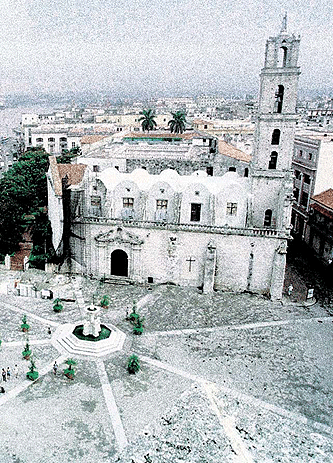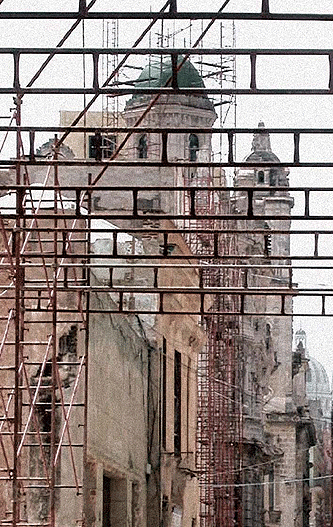The recovery of historical centres and their integrated development
Introduction
The City of Havana, founded at the beginning of the 16th century, is graced with a remarkable heritage of urban and architectural monuments in its historical centre. Due to the natural evolution of the city over the last century and a half the area became a marginal zone, and for several decades it was characterized by a marked deterioration of its buildings, the supplanting of appropriate uses by harmful ones, and poor habitat conditions in general.
The rehabilitation of the historical centre of Havana has been given an extraordinary boost with the implementation of a new management model established in 1993 – paradoxically, in the context of the worst economic crisis the country has ever suffered – which does not abandon public responsibility for the protection of national heritage. It takes culture as its guiding principle and places the human being at the centre of the whole process – as creator, conveyor and transmitter of cultural models and thus as the protagonist of development. To this socio-cultural vision of recovery an economic perspective using criteria of profitability was added, which sought to make the process sustainable.
The model is implemented by a sui generis entity, the Office of the Historian of the City of Havana, in recognition of its long history and experience in areas related to cultural heritage. The institution was founded in 1938, a pioneer in the transformation of heritage preservation and defence of national identity. It has always been closely tied to every tangible and intangible heritage preservation process and has lived through various political and socio-economic scenarios, in which it has always asserted its role as intellectual vanguard. The Office has maintained a permanent commitment with the Nation and has achieved important results through its work.
The Office’s long experience was guided first by Dr. Emilio Roig de Leuschenring, who was Historian of the City of Havana from the founding of the Office until 1964, and later by Dr. Eusebio Leal Spengler, who was creator and promoter of a humanist and revolutionary vision for the recovery of Cuba’s cultural heritage. For the last ten years the Office, with a team of collaborators, has developed and applied very novel management criteria. Dr. Eusebio Leal Spengler was honoured with the title “United Nations Goodwill Ambassador”.
Economic and social rehabilitation, closely linked to heritage preservation, has strategic importance in terms of human development. Understanding the three dimensions as integrated guarantees citizen involvement in the process. As the local economy gets reactivated using this perspective, it creates new jobs, improves living conditions and ameliorates the situation of marginality, replacing it with a dynamic of recovery that has a synergetic and multiplying effect on investments, expanding the recovered areas and increasing the resources available for development.
Beginning from when the new management mechanisms were first put in place, to date the Office has produced over 160 million USD which have been reinvested directly into the rehabilitation process. That activation of the local economy has furthermore mobilized numerous resources in funds from the National Bank, International Cooperation and the government budget, in national currency.
The work has been recognized first of all by the citizens and nation of Cuba, as shown by research and public opinion itself, which judges the results positively.
The main benefit obtained is the recovery of 33 percent of the Historical Centre area from support to the local economy, mainly from State, with the resulting creation of jobs on a grand scale. The integrating framework adopted allows for reinvestment of the resources obtained from the tourism industry and other sectors of the economy, with direct benefits to citizens. Old Havana may be seen as a laboratory experimenting with a new vision of how to manage historic areas.
The project has also received a high level of international recognition, in particular from the United Nations System, especially UNDP and UNESCO. Specialists have been convoked to more than 300 international forums in order to make better known how the process in the Historical Centre of Havana has developed.
Between 2000 and 2004, the experience of the Office of the Historian was awarded ten prizes and honours from prestigious international institutions.
DOWNLOAD THE BROCHURE PDF
albanian (0.8 MB)english (0.9 MB)
spanish (0.9 MB)
ONLY TEXT
•Adopting the office’s methodology in other countries








 COUNTRY OF ORIGIN
COUNTRY OF ORIGIN